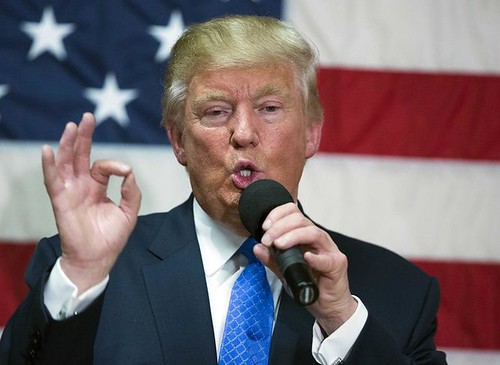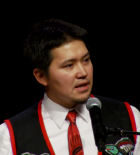Invoking Pocahontas: An act of racism disguised as politics
 Donald-Trump-asegura-renunciara-candidatura_LPRIMA20161008_0024_34 on flickr, shared into the public domain using Creative Commons Public Domain Dedication (CC0)
Donald-Trump-asegura-renunciara-candidatura_LPRIMA20161008_0024_34 on flickr, shared into the public domain using Creative Commons Public Domain Dedication (CC0)
At a recent event honoring Navajo Code Talkers who are World War II Veterans, President Donald Trump stated, "You were here long before any of us were here. Although we have a representative in Congress who they say was here a long time ago. They call her Pocahontas"[1]. This was not a first offense, as Trump has a history of referring to Senator Elizabeth Warren as Pocahontas. Trump’s “name calling” stems from Warren’s (albeit controversial) identification as Cherokee[2]. Fact, fiction, or it’s complicated, the accuracy of her ancestry is peripheral; calling Warren Pocahontas is racist and affects Native American people in unique and often unspoken ways. Labeling Warren Pocahontas is problematic for many reasons[3][4], but we focus in on how invoking a single identity misrepresents diverse nations and languages, marginalizing and limiting identities.
Native American people have historically been denied rights to self-determine identity. American Indians and Alaska Natives inherit their cultural and ethnic identity, but their legal status as a Native American is dependent upon the policies of American Indian and Alaska Native Tribes which must be recognized by the United States government[5]. The termination era of Native American politics ranged from the 1940s to the 1960s and its intent was to assimilate Native American people through cultural genocide. The result was a dramatic reduction in the recognition of Tribes and individuals, and loss of land and status as Indigenous peoples of the Americas[6]. Native American identity is further complicated by two key factors. First, forced sterilizations were carried out by the Indian Health Service in the 1970s. Research estimates one in four American Indian women were sterilized without consent and full-blooded Indian women were most targeted[7]. Second, in the same era 25%–35% of all Native children were being removed from their families by state child welfare and private adoption agencies, and 85% of those were placed outside of their families and communities, many of them with non-Indigenous families[8].
The effects of denying and erasing Native identities continues to occur in systematic and unrecognized ways, and psychologists are interested in understanding the impacts. Social psychologists Stephanie Fryberg and Sarah Townsend argue Native American people are invisible such that representations of groups and/or individuals are absent or misrepresented[9]. In the case of misrepresentation, relative invisibility occurs such that the group representation is erroneous and/or outdated—e.g., sports mascots and cartoon characters of Pocahontas. As a result, individuals must negotiate the fit of these representations to their self-concept and identity. While these representations are sometimes, on their face, positive in nature, they also have negative effects. Demonstrating this in a series of studies, Fryberg and colleagues first asked American Indian high school students to read about and view pictures of American Indian representations routinely found in newspapers and popular culture such as Walt Disney’s Pocahontas. Students were then asked to list the first five words that came to mind: Images such as Disney’s Pocahontas lead to generation of more positive words (compared to stereotypically negative representations). However, in subsequent studies, presenting these same representations was accompanied by lowered self-esteem and feelings of community worth (high school students), and generation of fewer achievement-related possible selves (e.g., obtaining a college degree among college students)[10]. As Leavitt, Covarrubias, Perez, and Fryberg[11] state, “These narrow representations not only define Native Americans as a homogeneous group ‘frozen in time,’ but also render invisible hundreds of diverse tribal cultures” (p. 42-43).
Outdated Native American characterizations similarly affect non-Native perceptions of the group. In recent work out of one of our research labs, Sesko and Welch found that presenting individuals with historically-based representations only, or by having people simply think about the past versus the present, lead to perceptions of Native American people as less likely to engage in intelligent (e.g., degree attainment, reading) and contemporary (e.g., using computers, social media) behaviors[12].
These historical transgressions and data suggest that invoking Pocahontas in reference to Senator Warren is not merely a political tiff between two parties without consequence. Pocahontas is not an insult, but was a human being who was kidnapped and forced into an assimilated life. Using her name to insult a fellow politician’s assumed identity, as if they are one and the same, is an act of racism that continues to misrepresent, homogenize, and marginalize Native American people. Our summary of history and research are brief, and this comment is not isolated: President Trump has habitually taken racist stances towards Native Americans[13][14], After calling Senator Warren ‘Pocahontas’ he turned to his Native American audience and benevolently made his derogatory intent clear stating, "But you know what? I like you. Because you are special. You are special people, you are really incredible people". Trump’s remarkable consistency for disparaging comments suggest they likely have direct policy implications, but importantly too, they legitimize racist ideologies, continuing to marginalize and silence identities of Native American people.
We conclude with a list of information related to Native American identities. We have titled it Kawdikei (from Tlingit language)—which translates to “fail completely” but a literal translation could be “to become unraveled like a worn-out basket”.
1. A fraternal organization for White men established in 1935 called the Improved Order for Red Men exists in which rituals are modeled after assumed Native American traditions. According to Wikipedia, membership has dropped from half a million in 1935 to a mere 15,000[15].
2. And there is the fraternal order Degree of Pocahontas made for exclusively White women [16].
3. Longmire wisdom of the day: “Most Americans don’t realize that even today in 2012, there are three things in America that are categorized by the government according to a pedigree: dogs, horses, and the indigenous people of this land” [17].
4. Featuring Debbie Porreco, a descendant of Pocahontas vs. Irene Bedard, the voice of Disney's Pocahontas on the topic of what Pocahontas would think of President Trump[18].
Finally,
5. Proving Native American ancestry can be tricky[19].
References
[1] Vitali, A. (2018, November 27). Trump calls Warren ‘Pocahontas’ at an event honoring Native Americans. Retrieved from https://www.nbcnews.com/politics/white-house/trump-calls-warren-pocahontas-event-honoring-native-americans-n824266
[2] Greenberg, J. (2017, December 1). The facts behind Elizabeth Warren, her claimed Native American ties and Trump’s ‘Pocahontas’ insult. Retrieved from http://www.politifact.com/truth-o-meter/article/2017/dec/01/facts-behind-elizabeth-warren-and-her-native-ameri/
[3] Alaska Federation of Natives (2017, November 28). AFN statement on President Donald Trumps disrespectful reference during honoring ceremony. Retrieved from http://www.nativefederation.org/afn-statement-on-president-donald-trumps...
[4] National Congress of American Indians (2017, November 27). National Congress of American Indians (NCAI) President Jefferson Keel issues statement on President Donald Trumps disrespectful reference during honoring ceremony. Retrieved from http://www.ncai.org/news/articles/2017/11/27/national-congress-of-americ...
[5] For reference, American Indian refers to indigenous peoples of the contiguous United States, Alaska Native—Indigenous peoples of Alaska, Native American—American Indian and Alaska Native peoples, and Native Hawaiian—Indigenous peoples of Hawaiʻi.
[6] Wilkins, D. E., & Stark, H. K. (2017). American Indian politics and the American political system. Rowman & Littlefield.
[7] U.S. National Library of Medicines (n.d.). 1976: Government admits forced sterilization of Indian Women. Native Peoples Concept of Health and Wellness. U.S. Retrieved from https://www.nlm.nih.gov/nativevoices/timeline/543.html
[8] National Indian Child Welfare Association (n.d.). About ICWA. Retrieved from https://www.nicwa.org/about-icwa/
[9] Fryberg, S.A., & Townsend, S.S.M., (2008). The Psychology of Invisibility. In Adams, G.,Biernat, M., Branscombe, N., Crandall, C.S., & Wrightsman, L.S. (Eds.), Commemorating Brown: The social psychology of prejudice and discrimination. Washington, DC: American Psychological Association.
[10] Fryberg, S.A., Markus, H.R., Oyserman, & D. Stone, J.M (2008). Of warrior chiefs and Indian princesses: The psychological consequences of American Indian mascots, Basic and Applied Social Psychology, 30, 208-218. http://dx.doi.org/10.1080/01973530802375003
[11] Leavitt, P. A., Covarrubias, R., Perez, Y. A., & Fryberg, S. A. (2015). “Frozen in Time”: The impact of Native American media representations on identity and self‐understanding. Journal of Social Issues, 71, 39-53. http://dx.doi.org/10.1111/josi.12095
[12] Sesko, A. K. & Welch, C. J. (unpublished data). The consequences of historical representations and thinking for stereotyping and behavioral attributes of American Indian and Alaska Native people.
[13] Keim, J. (2015, October 5). Donald Trump: Redskins a 'positive' name, Washington shouldn't change. ESPN. Retrieved from http://www.espn.com/nfl/story/_/id/13814698/donald-trump-says-nfl-washin...
[14] Bump, P. (2016, July 1). How Donald Trump’s 1993 comments about ‘Indians’ previewed much of his 2016 campaign. The Washington Post. Retrieved from https://www.washingtonpost.com/news/the-fix/wp/2016/07/01/how-donald-tru...
[15] Wikipedia (2017, December 21). Improved order of red men. Retrieved from https://en.wikipedia.org/wiki/Improved_Order_of_Red_Men
[16] Wikipedia (2017, November 14). Degree of Pocahontas. Retrieved from https://en.wikipedia.org/wiki/Degree_of_Pocahontas
[17] Tavare, J. (2012, August 8). Longmire: Dogs, horses and Indians. Huffington Post. Retrieved from https://www.huffingtonpost.com/jay-tavare/longmire-dogs-horses-and-_b_17...
[18] Brown. T. (2017, September 12). What would Pocahontas think about Donald Trump? Pow Wows.com. Retrieved from http://www.powwows.com/pocahontas-think-donald-trump/
[19] National Public Radio (2012, Jun 7). Proving Native American ancestry can be tricky. Retrieved from https://www.npr.org/2012/06/07/154519834/proving-native-american-ancestr...


